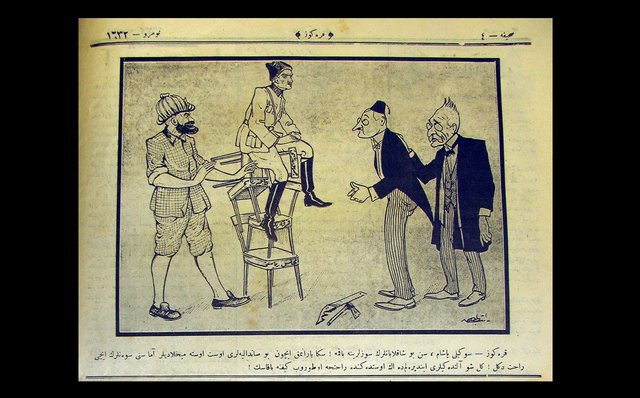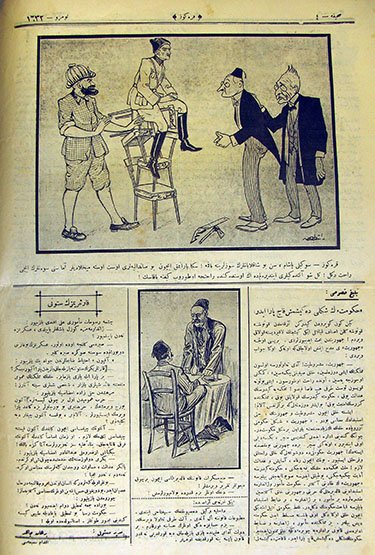121. Today in 1920s Turkey: 7 November 1923 (One Chair Is Plenty, Mr. President)

(Cartoon by Ratip Tahir, Karagöz, 7 November 1923, no. 1632, page 4.)
Türkçe:
Karagöz: Sevgili paşam, sen bu şaklabanların sözlerine bakma! Sana yaranmak için bu sandalyeleri üst üste mıhladılar ama seni sevenlerin içi rahat değil! Gel şu alttakileri indirelim de en üsttekinde rahatça oturup keyfine bakasın!
English:
Karagöz: My dear pasha, don’t pay any attention to the words of these buffoons! They nailed these chairs on top of one another in order to curry favor with you but those who love you are ill at ease! Come let’s remove the ones at the bottom so that you can sit comfortably on the one at top and enjoy yourself!
Comments
Published ninety-four years ago today, this cartoon comments on the recent development dominating the news cycle: the founding of the Republic and Mustafa Kemal (Atatürk)’s ascent to the office of the Presidency. Both events from the previous week (29 October) garnered a fair amount of support as well as suspicion. In the case of the satirical journal Karagöz, subverting the excessive enthusiasm demonstrated by certain members of the press for Mustafa Kemal Pasha’s new role as President is the focus of the cartoon. Mustafa Kemal Pasha was, of course, the celebrated leader and hero of the Turkish War of Independence (1919-1922) and he is featured perched atop the tower of precariously stacked chairs at the center of the cartoon. With him on the left is Karagöz, the mascot of the Karagöz magazine, and two journalists on the right. The journalists are Celal Nuri (İleri) and Ahmet Ağaoğlu, who were both keen supporters of Mustafa Kemal Pasha’s candidacy for the presidency and apparently, much more.
The text below the cartoon reveals Karagöz addressing the new president on behalf of the people (halk). Here, it is revealed that the tower of chairs was built by the journalists and Karagöz attributes their efforts to their desire to express their blind loyalty to the new head of state. Karagöz urges Mustafa Kemal Pasha to remain in the top chair but abandon the other chairs below it. The chairs are, in fact, each carefully labeled. From top to bottom they read: Presidency (Cumhur Riyaseti), Prime Ministry (Kabine Riyaseti), Party Chairmanship (Fırka Riyaseti), and Speaker of the House (Meclis Riyaseti). Karagöz warns the new President that despite what the press may advocate, the occupying of all of those roles by one person makes “those who love you” uneasy.
Such discussions surrounding the limits of power, the new form of government and the role of the presidency are not unfamiliar to the pages of Karagöz in particular and the satirical press in general. For instance, post #23 of Today in 1920s Turkey covers a “typical” discussion among parliamentary representatives regarding the future of the government from a month earlier, on 3 October 1923. But Karagöz is a pragmatist and his namesake magazine represents the interests of the common people, which is why the cartoon views with suspicion the many powers some overly zealous supporters are ready to hand over to the one man. A lack of separation in branches of government often leads to corruption and injustices—a state of affairs that almost always effects the masses negatively. These kinds of practical, apolitical, basic concerns are at the heart of an article located directly below this cartoon, in the lower right column of the same page. Luckily, last year’s Today in 1920s Turkey post from 7 November was precisely about this sister content! To read on see: Post #30: Changing Regimes or Changing Mentalities?

(Entire page, Karagöz, 7 November 1923, no. 1632, page 4.)
türkiyenin geçmişi ile ilgili çok güzel paylaşımlarınız var elinize sağlık :)
Çok teşekkür ettim ve paylaşımlardan keyif aldığına sevindim. Dönem kendisi enteresan olunca benim işim kolay aslında…
bazen o dönemde olmak istiyor insan , gerçek insanlıkla birlikte , şimdi herkes yapmacık sahte kimliklere bürünmüş herkes.
Yukarıdaki düşüncenizin aklımdan geçmediği tek bir gün bile yok.
Very interesting indeed. I think too much power to one person is dangerous because it prevents others from having a say. And this eventually leads to dictatorship.
I agree... there are definite dangers to concentrating power in one place. I also like how the magazine is attempting to keep other journalists and publications in check and calling them out for being too overly supportive. Division of power and an objective press are fundamental to a healthy civil society, in theory. Whether that can be achieved in practice is another sad story.
That's true. The media should be able to hold those in power to account and call them out when necessary. But like you said, it's not always the case especially as they fear repercussion.
Yes, the media has the potential to keep everyone honest, but since it, too, is powered by capital and regulated by the government once again the cards are stacked against the voiceless.
I couldn't agree more!
This post has been modified, updated, and re-posted on 7 November 2018. Access the new edition here.